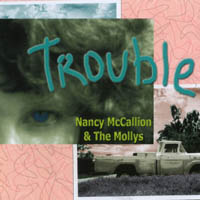 Disclosure: I’m a long time Molly’s fan! Live, recorded, whatever, I’m there. There’s something about the world-weary defiance, the determination to feel joy — or at least pleasure — in The Mollys’ music, that warms the soul. For the unitiated, The Mollys have always combined Celtic and Tex Mex influences in a heady blend that seems almost, but not quite, like the Appalachia meets Cowboy influenced-music that made alt-country popular. On early albums I found The Mollys’ influences less integrated, and have remarked on how difficult it was to describe this band. But now that the band has morphed in to Nancy McCallion and The Mollys I’d say, “what the heck, The Mollys are a Southwest country band, pure and simple.” Some of this seems to be due to the departure of Catherine Zavala, whose voice had a darker tone than McCallion, and who carried some of the great raucous numbers that were more overtly Celtic rather than country in flavour. Which brings me to my next disclosure: I miss Zavala’s distinctive voice and the variety in sound that her contributions gave earlier Mollys albums. Her loss is palpable for a long-time fan who hasn’t seen the band in awhile. But enough of the past — what about Trouble?
Disclosure: I’m a long time Molly’s fan! Live, recorded, whatever, I’m there. There’s something about the world-weary defiance, the determination to feel joy — or at least pleasure — in The Mollys’ music, that warms the soul. For the unitiated, The Mollys have always combined Celtic and Tex Mex influences in a heady blend that seems almost, but not quite, like the Appalachia meets Cowboy influenced-music that made alt-country popular. On early albums I found The Mollys’ influences less integrated, and have remarked on how difficult it was to describe this band. But now that the band has morphed in to Nancy McCallion and The Mollys I’d say, “what the heck, The Mollys are a Southwest country band, pure and simple.” Some of this seems to be due to the departure of Catherine Zavala, whose voice had a darker tone than McCallion, and who carried some of the great raucous numbers that were more overtly Celtic rather than country in flavour. Which brings me to my next disclosure: I miss Zavala’s distinctive voice and the variety in sound that her contributions gave earlier Mollys albums. Her loss is palpable for a long-time fan who hasn’t seen the band in awhile. But enough of the past — what about Trouble?
This is a fine album, with a more integrated, cohesive sound than some past efforts. Nancy McCallion and The Mollys have settled on a distinctive, twangy sound that borrows as much from Cajun music as it does from McCallion’s Scottish roots, thanks to the accordion playing of Kevin Schramm. McCallion’s got a classic old-time country singer’s voice, and has honed her vocal talents over the years, and her song writing continues to be strong, with classic stories encoded in ballads, with just a touch of introspection, as in “You Could Learn my Ways” or “Mother Mother” (the only song on Trouble with overt Celtic influences). Other long time members are Dan Sorrenson on fretless bass, Marx Loeb on drums, and Danny Krieger on guitar. Krieger contributes vocals on his own composition “Piggyback Rider” and on “This is My Round”, a popular live number from days gone by, while Lisa McCallion fills in with some backing vocals on other numbers.
All in all, this is a slightly less frenetic version of The Mollys than past efforts, although Trouble maintains the intensity and the superb instrumental backing that positions this group so firmly in the American West. I particularly love the interplay between the guitar and accordion throughout Trouble, which provides the perfect accompaniment for McCallion’s vocals. If you, like me, have loved The Mollys for years, you’ll like Trouble. If you just like roots country music with a southwest flavour, by all means get this disc. It stands strong and tall alone and alongside their previous work.
(self released, 2002)
